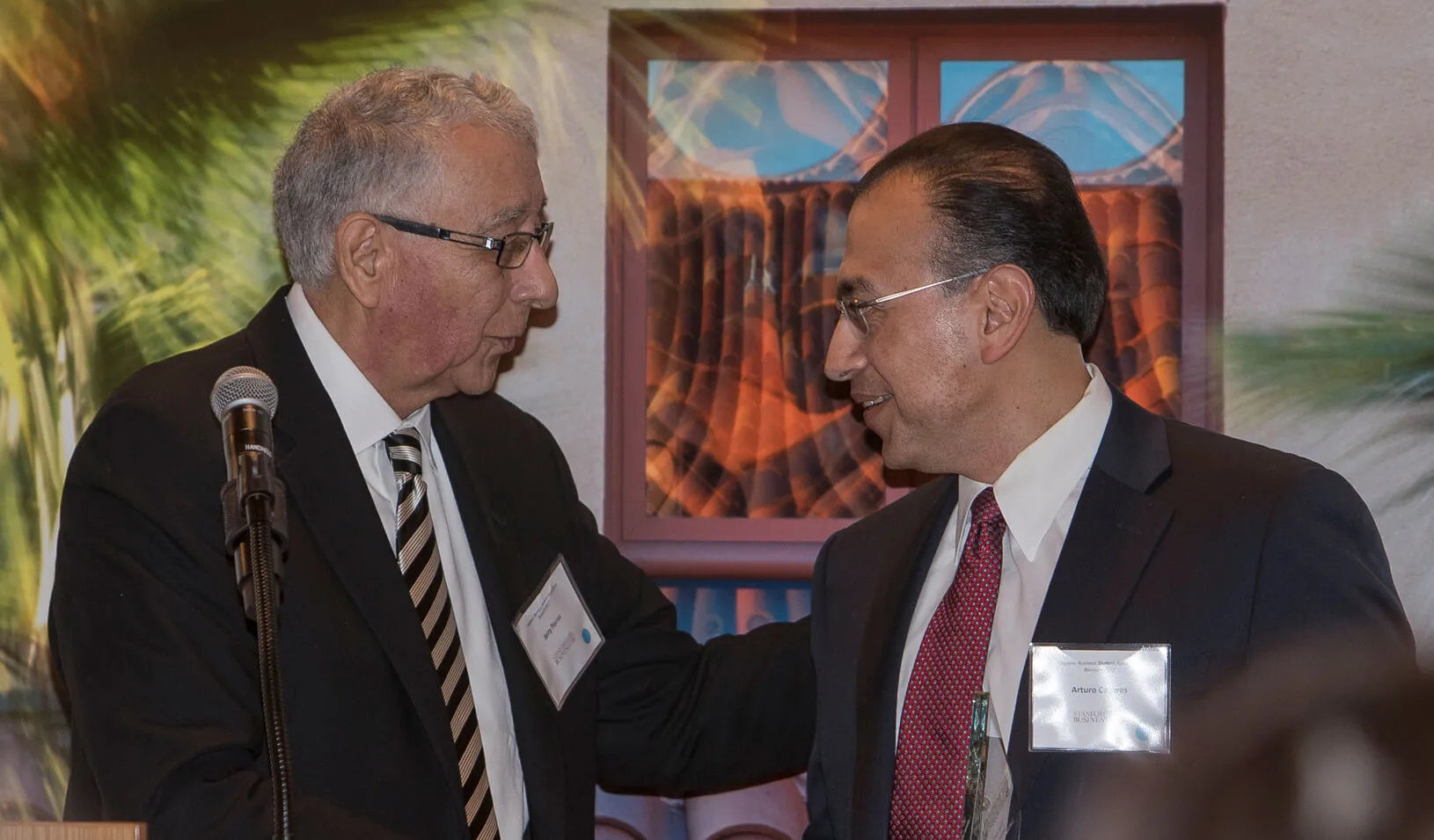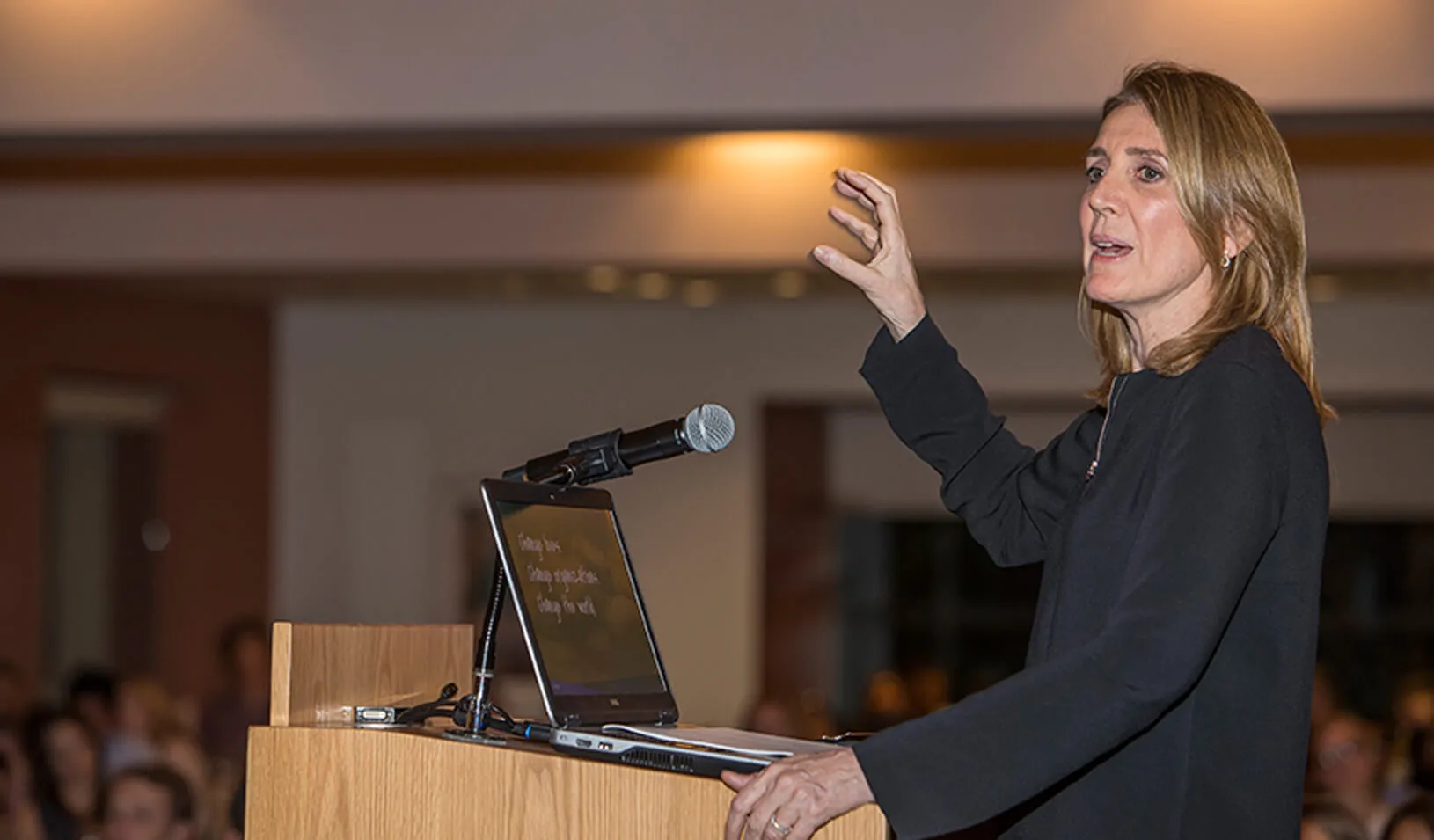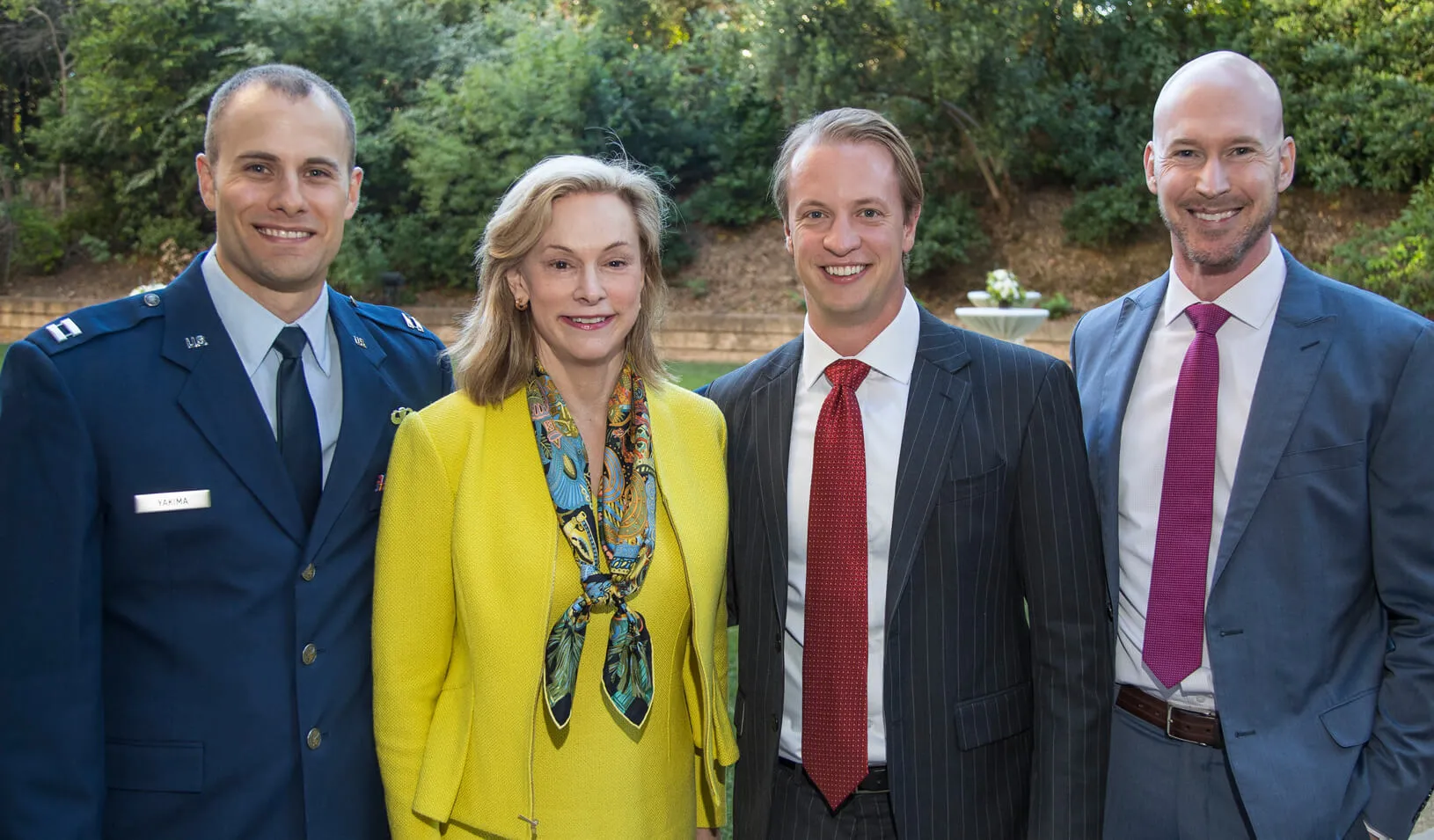June 29, 2017
Defined in its broadest terms, diversity at Stanford Graduate School of Business embraces inclusiveness stemming from such differences as personal and professional experiences, goals, cultures, socioeconomic status, ethnicity, gender, sexual orientation, and nationality.
This spring the Military Service Appreciation Dinner, Women in Management Banquet, Asian Business Students Association Gala, Hispanic Business Students Association Latino Leadership Banquet, and Black Business Students Association Gala each drew hundreds of students, faculty, staff, and guests to vibrant festivities that featured inspiring messages, uplifting performances, and opportunities to bond over shared experiences.
Black Business Students Association Gala
On a Sunday evening last July, Stacy Brown-Philpot MBA ’02 was shaking from the news of Alton Sterling and Philando Castile, two African-American men killed by police a few days prior. Preparing for the next morning’s routine company meeting, Brown-Philpot, chief executive officer at the errand-running marketplace TaskRabbit, knew she couldn’t just lead the usual company cheerleading and back-patting.
“I’m going to have to be a Black CEO,” Brown-Philpot recalled thinking at that moment. She didn’t want a business-as-usual meeting, so “I went to work the next day and talked about what it’s like to be Black in America.” That decision to speak openly about a difficult and serious subject reflected a desire to be her “authentic self as a CEO,” Brown-Philpot told an audience of about 300 at the 34th Annual Gala of the Black Business Students Association, held on Feb. 25 at Stanford University Graduate School of Business.
Brown-Philpot spoke as the recipient of the 2017 Tapestry Award, which honors a Stanford GSB graduate who has woven inspirational leadership, intellectual excellence, and service to others in professional and personal life. Noting the gala’s theme of “Redefining the Agenda: Leadership that Demands Change,” Brown-Philpot encouraged audience members to step up to effect societal change. “We are the ones, I am the one, we collectively are the ones we’ve been waiting for,” she said. “How do we respond to the call?”
In his opening remarks, Dean Jonathan Levin noted that the diversity of Stanford GSB’s student body makes graduates well-suited and well-equipped to bring about change. “Leadership in American business does not yet reflect the diversity of the student body here at Stanford GSB,” he said. “That means that we a school have a remarkable opportunity to change this.”
The gala included a fireside chat with Lisa Lambert, Harvard Business School MBA ’97 and graduate of Stanford GSB’s Executive Education Accelerator Program, and moderator Royal Bryson MBA ’94. As the former leader of Intel Capital’s Diversity Fund, which funds technology startups run by women and underrepresented minorities, Lambert recalled individuals who questioned the need for such an initiative. But that resistance didn’t diminish her resolve. “You do the things that you feel responsible to do,” said Lambert, currently managing partner at venture capital firm The Westly Group. “You take risks because it’s right.”
The evening opened and closed with an uplifting performance by singer-songwriter Jessica La Rel BA ’14.
Hispanic Business Students Association Latino Leadership Banquet

Arturo Cazares, MBA ’89, accepts the Jerry I. Porras Leadership Award from the award’s namesake. | Stacy Geiken
Growing up poor in Stockton, Calif., Arturo Cazares, MBA ’89, lacked “social capital,” or the personal connections and cultural knowledge and experiences that can pave the way to success. But attending Stanford changed Cazares, the son of immigrants from Mexico. His social capital, Cazares said, “went through the roof” thanks in large part to the strong bonds among Latino alumni helping him build a successful corporate career.
Those in that alumni network are in the position to support not only each other but also the larger Latino community, Cazares told an audience of about 300 at the 21st annual Jerry I. Porras Latino Leadership Banquet organized by the Stanford GSB Hispanic Business Student Association and held March 11 on campus. “Social capital extends to all the people who are connected to that network even if they’re not a direct part of it,” he said. “And the greater Latino population is connected to us; they’re our brothers, our cousins, our nephews, our nieces.”
Cazares, the chief operating officer at data-security firm CipherCloud, spoke as the recipient of the Jerry I. Porras Latino Leadership Award honoring his professional achievement and his work strengthening Stanford’s Latino community and creating educational opportunities for disadvantaged communities. The award is named for Jerry I. Porras, Lane Professor of Organizational Behavior and Change, Emeritus.
As the Latino community builds social capital and increasingly prospers generation by generation, “we’ll be touching all aspects of American society,” said Cazares, who also holds an undergraduate engineering degree from Stanford.
Dean Levin, in introductory remarks, described his own family’s immigration path to the United States and their subsequent achievements. “Everyone here tonight has their own version of this story. … Someone in your family came with aspirations,” he said. As Stanford GSB students pursue their own aspirations, they will be a force for change, Levin added. “You will help set the tone and the culture in your organizations and your communities, and you will create opportunities for others,” he said.
Professor Porras also addressed the gathering, citing the successes of the Stanford Latino Entrepreneurship Initiative, a collaboration of Stanford GSB and the Latino Business Action Network, an independent research and training organization. The initiative focuses on the development of large Latino-owned businesses. “We believe that’s the most powerful way to increase wealth in the Latino community, jobs in the Latino community, and as a result to begin to influence society,” Porras said.
Asia Business Students Association Gala

Zuora CEO Tien Tzuo, MBA ’98, spoke about breaking through the “bamboo ceiling.” | Courtesy of Zuora
Growing up in ethnically diverse Brooklyn in the 1970s, Tien Tzuo, MBA ’98, didn’t dwell on his Taiwanese roots but rather regarded himself simply as “a minority.” But later, at Cornell University and in the workplace, Tzuo became conscious of the stereotype of Asians as quiet, self-effacing followers.
Two years into his first job, Tzuo moved from engineering into sales. “I didn’t consciously do it to overcome Asian-ness,” said Tzuo, the keynote speaker at the annual gala of the Stanford GSB Asia Business Student Association. But working in sales, where he had to interact constantly with customers, taught him assertiveness and the social and leadership skills that would help him advance his career and ultimately become an entrepreneur.
With the theme “Breaking Through the Bamboo Ceiling,” the April 8 event attracted about 250 students, alumni, and supporters to the campus to celebrate the diversity of Stanford GSB’s Asian community.
Now cofounder and chief executive of software firm Zuora Inc., Tzuo still draws on the interpersonal skills he learned in sales. “I’m comfortable being a public face of the company,” he added. Tzuo advised audience members to “choose roles that take you out of your comfort zone” and that teach new skills, especially in communication and engaging people.
Dean Levin, in opening remarks, spoke of the importance of inclusivity both inside and outside the school. “Part of freedom is not being held back by barriers or attitudes or stereotypes that limit opportunity,” he said. “We place enormous emphasis here on promoting acceptance and empathy and understanding. These are core values of Stanford GSB.” The gala event, Levin added, helps connect students, alumni, and friends to build a strong Asian business community.
Denise Peck, MBA ’85, chapter lead of the recently established Stanford GSB Asian Alumni organization, also spoke of the chapter’s other activities, including starting a mentoring program and hosting social events, such as a dinner pairing wines with Asian dishes.
Women in Management Banquet

“Speaking over someone can be toxic,” said Ruth Porat, chief financial officer of Google and parent company Alphabet Inc. | Stacy Geiken
In the midst of the 2008 financial crisis, Ruth Porat left work to head home for a shower after pulling an all-nighter. A top executive banking giant at Morgan Stanley at the time, Porat discovered that her three young sons had left her handwritten messages of encouragement on sticky notes, with the middle child telling her, “We’re so proud of you.”
That emotional support during the crisis was part of her years-long effort to create a “mix” of work and family, said Porat, now chief financial officer of Google and parent company Alphabet Inc. She preserves those notes in a frame and sees them each day, added Porat, the keynote speaker at the Women in Management Banquet 2017, held on May 3 at the Stanford Graduate School of Business. With the theme “Making Change Stick,” the annual event drew about 400 alumni and students to the campus.
Besides receiving support from a spouse or children, eliminating guilt is a key element of mixing work and family. “Do not feel guilty,” Porat said. If guilt does strike, she added, address it by thinking, “This is an investment in my longevity” in a career. Moreover, for children to see their mother pursuing work she finds meaningful conveys a strong message. As for her own sons, “I hope they’ll be better partners as a result of that,” she said.
In kicking off the evening’s program, Dean Levin noted that 40% of the MBA candidates at Stanford GSB are women, as are a third of PhD students. Yet, Stanford GSB still aims to increase those shares and also add more women to its teaching ranks, where women currently account for more than a third of junior faculty. Through both faculty research and the activities of both male and female alumni in the working world, “the school can influence systemic barriers in the workplace,” said Levin. “As you reach positions of leadership and influence, you will help break down barriers that exist today,” he told the audience.
Porat, who is also vice chair of the university’s Board of Trustees and a board member of Stanford Management Company, offered attendees many pieces of practical career advice. Just as she benefited from sponsors who took risks on her and gave her opportunities to learn, others should seek sponsors willing to provide “air cover,” or support and direction, she advised. At the same time, “you have to earn it” through performance and willingness to help others. Porat also reminded women to stick up for themselves and their colleagues and not to tolerate those who try to drown out others in meetings or other business situations. “Speaking over someone can be toxic,” Porat said. “Let her finish is a really powerful phrase.”
Military Service Appreciation Dinner

From left, Capt. Mike Yakima, dinner co-chair; Linda Huber; Nathan Brasher, dinner co-chair; and keynote speaker John Fenwick. | Stacy Geiken
Linda S. Huber, MBA ’86, openly acknowledges that her job as a top financial-services executive may not be the cool position that today’s business school students want. “It might be the opposite of sexy,” said Huber, chief financial officer at Moody’s Corp., to an audience at Stanford Graduate School of Business’ annual Military Service Appreciation Dinner, where she was the honoree. “I doubt there is one student at Stanford GSB who aspires to do what I do,” she added.
“I would urge all of you to rethink your allergy to going into a corporation,” said Huber. Her own career in the U.S. Army was “emotionally rewarding” but paid poorly, while her subsequent work in investment banking paid well but didn’t “do great things for your soul.” Corporate life, though, brings advantages: “In a corporation you can choose your team, you can choose to do the right thing, and you own the results,” Huber said. “You’re not passing in and out of companies, you’re not doing a transaction and then another transaction. … For me, a public corporation is just right.”
Huber also received the 2017 Service and Leadership Award recognizing outstanding achievement in business or business education. She is the first woman to receive the recognition, presented annually since 2009 by the Stanford GSB Veterans Club. An active duty officer in the Army from 1980 to 1984, Huber attained the rank of Captain, was airborne-qualified, and received two Meritorious Service Medals. As an alumna, Huber served on the Stanford GSB Advisory Council from 2008 to 2013.
About 400 alumni and supporters attended the May 12 gala, which included the posting of colors by the color guard of the Naval Operations Support Center San Jose and the singing of the national anthem by Maxine Schlein, MBA ’17. Organized by the Stanford GSB Veterans Club, the event recognizes the service of the world’s defense forces and the achievements of military personnel in both military and civilian contexts.
Keynote speaker John Fenwick, MBA ’09, recalled his longstanding risk aversion, developed during his years as an Air Force officer managing intelligence and space programs. Given his background, “it’s pretty remarkable that Stanford GSB reshaped me, of all people, into a risk-taking entrepreneur,” said Fenwick, who cofounded satellite-imaging firm Skybox Imaging Inc., acquired by Google in 2014. Attending Stanford GSB, he said, prepared him to embrace the lessons of startup life: “One task and one step at a time, heads down, ignore the naysayers, make-or-break decisions often come down to semi-educated guesswork, and finally, the importance of individual heroics carry the day.”
Dean Levin recognized the current and former military personnel enrolled in Stanford GSB’s MBA and MSx programs as well as the Stanford Ignite program for post-9/11 veterans. “The experience you bring is distinctive among your classmates,” Levin said. “You bring a perspective on leadership and teamwork. You share a notion of deeply ingrained service and sacrifice. Your classmates and I admire this.” The challenge of making the transition to the classroom can be significant, especially for those who served in combat, Levin said, and “it’s inspiring that our military students rise to the occasion, share their knowledge with their classmates, and excel as leaders at Stanford GSB and beyond.”
— By Louise Lee
For media inquiries, visit the Newsroom.



